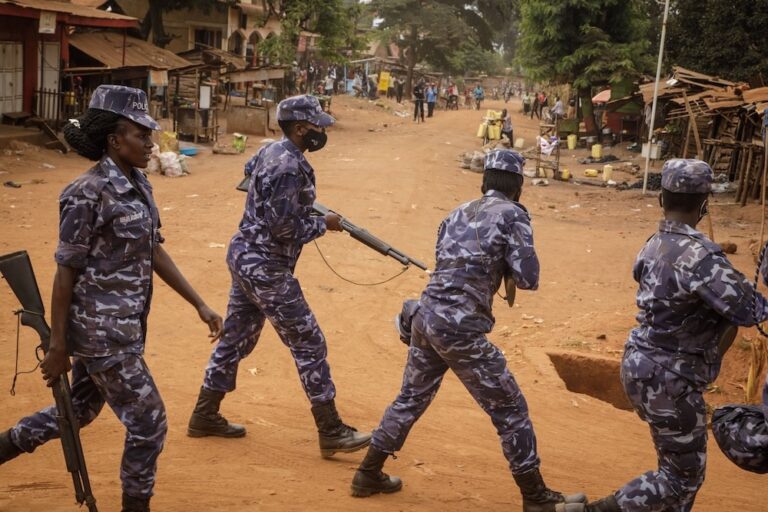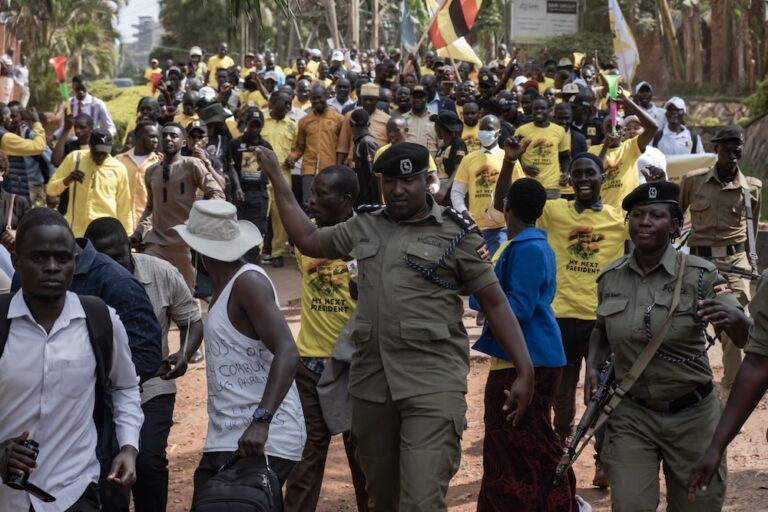The Uganda Communications Commission has told radio stations to stop airing a new song by renowned local artist Ssentamu Kyagulanyi (a.k.a Bobi Wine), pending investigations into claims that it is critical of the Kampala Capital City Authority's Executive Director.
(HRNJ-Uganda/IFEX) – 24 September 2012 – Uganda’s broadcast regulatory body, the Uganda Communications Commission (UCC), has banned radios from airing a new song by renowned local artist Ssentamu Kyagulanyi (a.k.a Bobi Wine), pending investigations into claims that it is critical of the Kampala Capital City Authority’s (KCCA) Executive Director, Jennifer Musisi.
The song “Tugambire ku Jennifer”, translated to mean “please talk to Jennifer on our behalf” was released earlier this month by Wine, the self-proclaimed “Ghetto president.” The translated chorus says, “tell Jennifer on our behalf to reduce her harshness, because the town is ours.”
The song discusses Kampala’s problems, ranging from increased murders and robberies to the eviction of vendors off Kampala’s streets. The song also allegedly points out that Jennifer’s ruthlessness is worsening the lives of poor city dwellers.
Article 29 1(a) of the Constitution of the Republic of Uganda, 1995 states that “everyone shall have the right to freedom of speech and expression which shall include freedom of the press and other media.”
In addition, the regional charters and international conventions that the Ugandan government has signed provide for this right. Everyone shall have the right to freedom of expression; such a right shall include the freedom to seek, receive and impart information and ideas of all kinds, regardless of frontiers, either orally, in writing or in print, in the form of art, or through any other media of their choice.
The Executive Director of the UCC, Godfrey Mutabazi, could not name a particular individual who complained about the song. However, he told the Human Rights Network for Journalists-Uganda (HRNJ-Uganda) that they had received complaints about the intentions of the song. “Several people complained to the commission that the song was abusive, so we can’t allow the airwaves to be used to insult others. The song was not banned, but we have instructed airwaves not to play the song until our investigations are complete, so that we can pronounce ourselves on it. We got the song from our data bank, and we are investigating it,” said Mutabazi.
Mutabazi, however, could not tell how long the investigations would take before the commission can pronounce itself on the song. In 2009, the UCC arbitrarily and excessively closed down five private radio stations and also banned open air radio talk shows, which were providing platforms to citizens to check those in power. All of them are back on air and the last one was re-opened in late 2010. Nevertheless, none of the media managers or journalists were taken to court to answer for the alleged flouting of broadcasting regulations.
Wine told HRNJ-Uganda that the song was not an attack on any person, but his right to freedom of expression as a stakeholder in the capital. He refuted claims that it was directed at Jennifer Musisi.
Wine also said that the UCC should not be used to serve individual interests. “Let me advise the commission to remember that they are mandated to serve all the people and not a person. Let it listen to what the people are trying to communicate instead of intimidating their messenger. Listen to the voice of the people and understand instead of misunderstand; communicate, don’t miscommunicate!”
Asked whether the airwave ban on the song was communicated to Wine, Mutabazi said that as a commission, they only deal with broadcasters and not producers, so they did not need to do so at the time. Wine said he was set to launch the song next month in October, although it was still not clear whether Musisi would allow holding the music concert in the city. However, he defended his song by saying, “Jennifer does not mean Jennifer Musisi the Executive Director of KCCA.”
“The commission should accord the artist a fair hearing since investigations are ongoing. [It should] avoid misusing its powers to curtail his right to freedom of expression,” said HRNJ-Uganda’s National Coordinator, Wokulira Ssebaggala.


